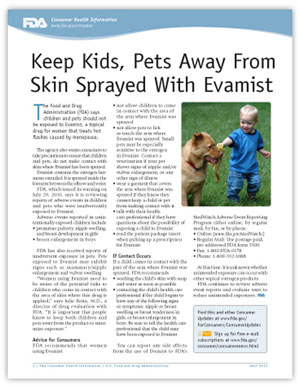Keep Kids, Pets Away From Skin Sprayed With Evamist
On this page
The Food and Drug Administration (FDA) says children and pets should not be exposed to Evamist, a drug for women that is sprayed on the skin to treat hot flashes caused by menopause.
The agency also wants consumers to take precautions to ensure that children and pets do not make contact with skin where Evamist has been sprayed.
Evamist contains the estrogen hormone estradiol. It is sprayed inside the forearm between the elbow and wrist.
FDA, which issued its warning on July 29, 2010, says it is reviewing reports of adverse events in children and pets who were inadvertently exposed to Evamist.
Adverse events reported in unintentionally exposed children include
- premature puberty, nipple swelling, and breast development in girls
- breast enlargement in boys
FDA has also received reports of inadvertent exposure in pets. Pets exposed to Evamist may exhibit signs such as mammary/nipple enlargement and vulvar swelling.
"Women using Evamist need to be aware of the potential risks to children who come in contact with the area of skin where this drug is applied," says Julie Beitz, M.D., a director of drug evaluation with FDA. "It is important that people know to keep both children and pets away from the product to minimize exposure."
Advice for Consumers
FDA recommends that women using Evamist
- not allow children to come in contact with the area of the arm where Evamist was sprayed
- not allow pets to lick or touch the arm where Evamist was sprayed. Small pets may be especially sensitive to the estrogen in Evamist. Contact a veterinarian if your pet shows signs of nipple and/or vulvar enlargement, or any other sign of illness
- wear a garment that covers the arm where Evamist was sprayed if they know they cannot keep a child or pet from making contact with it
- talk with their health care professional if they have questions about the possibility of exposing a child to Evamist
- read the patient package insert when picking up a prescription for Evamist
If Contact Occurs
If a child comes in contact with the part of the arm where Evamist was sprayed, FDA recommends
- washing the child's skin with soap and water as soon as possible
- contacting the child's health care professional if the child begins to have any of the following signs or symptoms: nipple or breast swelling or breast tenderness in girls, or breast enlargement in boys. Be sure to tell the health care professional that the child may have been exposed to Evamist
You can report any side effects from the use of Evamist to FDA’s MedWatch Adverse Event Reporting Program online or by mail, fax, or phone.
o Regular Mail: Use postage-paid, pre-addressed FDA form 3500
o Fax: 1-800-FDA-0178
o Phone: 1-800-332-1088
At this time, it is unknown whether unintended exposure can occur with other topical (applied to the skin) estrogen products.
FDA continues to review adverse event reports and evaluate ways to reduce unintended exposures.
This article appears on FDA's Consumer Updates page, which features the latest on all FDA-regulated products.
Posted July 29, 2010
Return to FDA Consumer Articles

